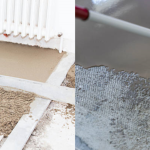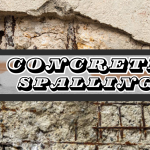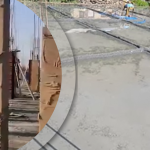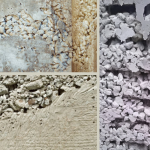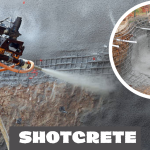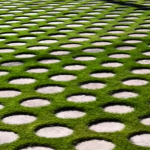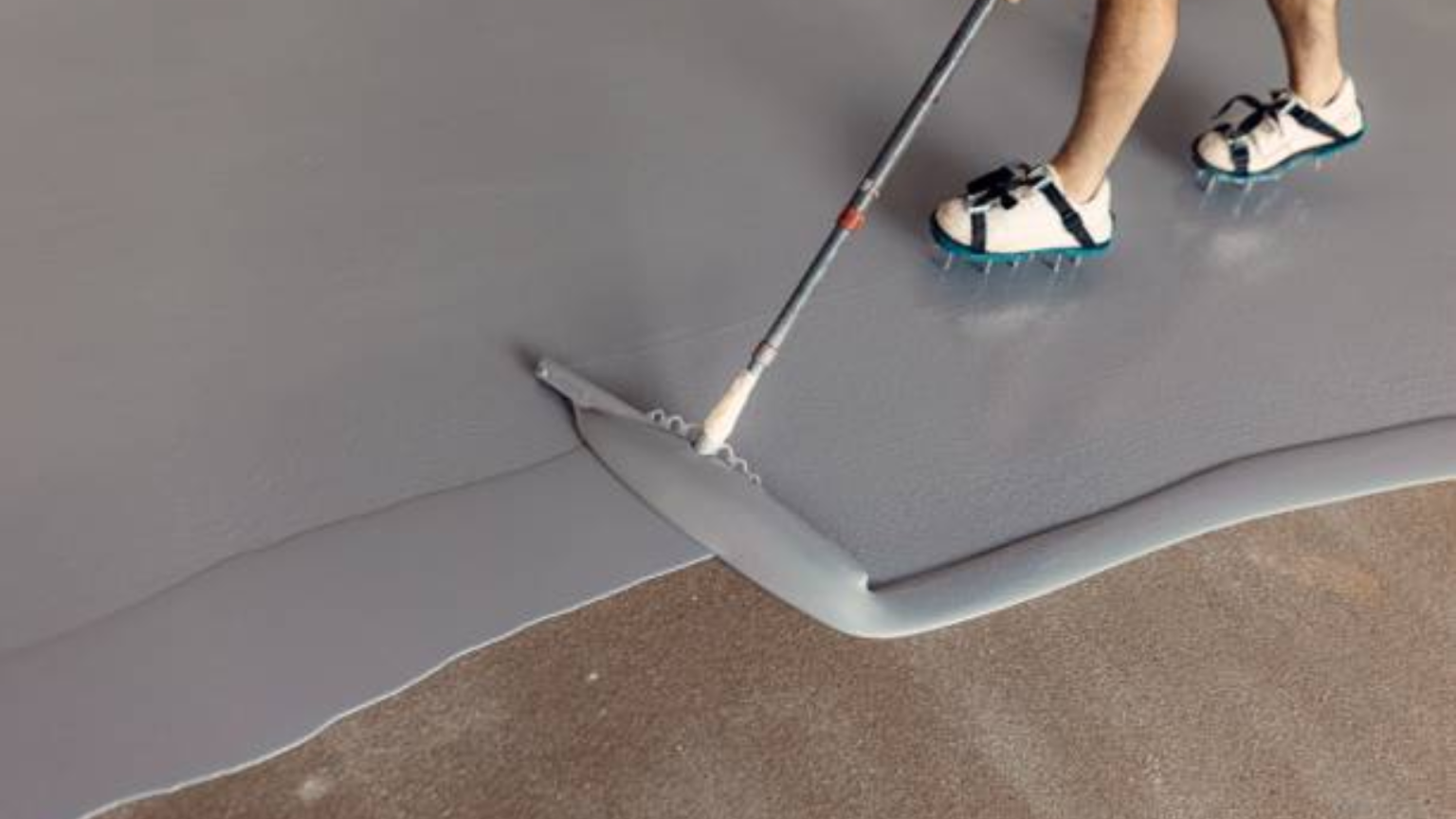
EPOXY FLOORING: TYPES | ADVANTAGE AND DISADVANTAGES
An epoxy floor is one that has an epoxy layer that is at least two millimetres thick. The depth of epoxy is what distinguishes epoxy flooring from epoxy coating. It is also referred to as “resinous flooring.”
Epoxy flooring is extremely durable, long-lasting, and decorative for any surface. This flooring’s appealing feature is that it has a higher level of resistance to wear and tear, making it the most long-lasting flooring option.
Epoxy coating is typically applied to concrete floors to provide a smooth, durable surface and increase the floor’s load-carrying capacity.
Epoxy floors are primarily used in industrial sites, warehouses, and commercial buildings to keep workers, equipment, and inventory clean and safe.
This floor coating is made up of resin and hardeners. There are numerous additives that can be added to create a coating that performs well in a wide range of flooring applications, such as accelerators, flow control agents, UV inhibitors, adhesion promoters, and so on.
Using these additives, one can achieve desired performance characteristics such as increased abrasion resistance, faster cure, higher chemical resistance, and so on.
Epoxy can be made more visually appealing by adding different pigments, decorative coloured quartz aggregate, vinyl flakes, glitter, and so on.
To make the epoxy into a thicker, more robust, and non-slippery flooring system, various types of aggregate sand blends (slurry, trowel, broadcast, etc.) can also be added.
Epoxy Flooring Mechanism
The most commonly used epoxy resins are made through a reaction between bisphenol-A (BPA) and epichlorohydrin (ECH), which can be obtained in either solid or liquid form. To convert the epoxy into a strong, infusible, and rigid material, the resin must be hardened.
Epoxy resins cure easily at temperatures ranging from 5–150 °C. Curing the resins converts the epoxy resins into epoxy thermoset polymers with distinct resistance, versatility, durability, and adhesion properties.
Types of Epoxy Flooring
Epoxy floors have a seamless appearance, are incredibly adaptable, and can be produced in a wide range of colours, effects, styles, and decorative options. These characteristics are ideal for commercial or industrial facilities and locations. There are various general types of epoxy flooring, including:
Anti-Static Epoxy Floors
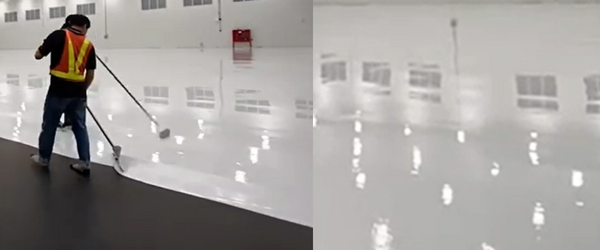
An electrostatic charge can be hazardous in a variety of work situations, so anti-static epoxy floors are used in these areas to avoid static hazards. This floor is made of a conductive material that stores static electricity and diffuses any potential discharge.
For areas with flammable materials, an anti-static epoxy floor is a much better option. It is appropriate for areas where flammable gases or liquids are at risk of ignition.
It is widely used in chemical, electronic, healthcare facilities, as well as pharmaceutical manufacturing facilities.
Epoxy Flake Floor
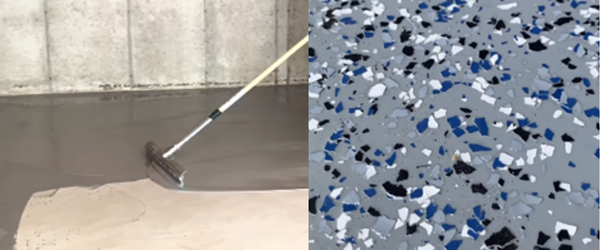
Epoxy flake floors have a vibrant appearance because coloured flake materials are incorporated into epoxy flooring. The flakes also provide grooves on the surface, reducing falls and slips. This type of epoxy is available in a wide range of colours, styles, sizes, and textures, allowing you to improve the appearance of any floor.
Epoxy flakes floors can be used in showrooms, sports arenas, bathrooms, bars, locker rooms, garages, clinics, commercial kitchens, churches, schools, laundromats, laboratories, hospitals, grocery and retail stores, among other places.
Epoxy-mortar Floor
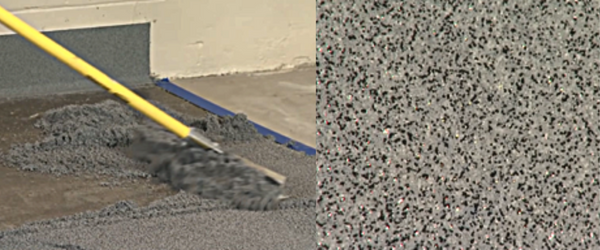
Epoxy-mortar floors consist of 100% solid epoxies and quartz sand. It is used for floors that need to be more resistant to impact loads and chemicals. It can also be used to fill cracks prior to installing another type of epoxy floor.
Epoxy mortar floors are used in mechanical spaces, commercial kitchens, warehouses, restaurants, garages, and manufacturing facilities.
Quartz-Filled Epoxy Floor
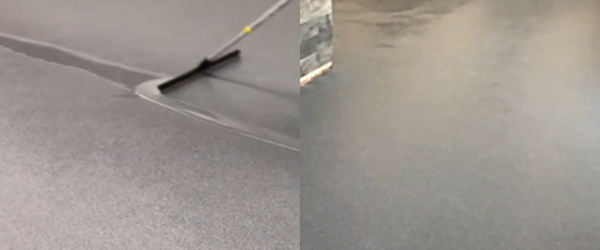
The stained quartz grains and high-performance epoxy polymer resin combine to form the quartz-filled epoxy floor. This epoxy floor is used in decorative areas where sanitary and slip-resistant properties are required.
Quartz-filled epoxy floors are used in lobbies, offices, showrooms, restrooms, locker rooms, schools, cafeterias, and other locations.
Self-Leveling Epoxy Floor
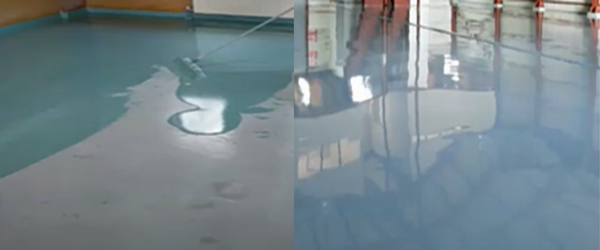
A self-leveling epoxy floor coating is a type of epoxy that can be used to coat concrete floors and produce a long-lasting, low-maintenance flooring surface. To create a smooth, seamless surface, self-leveling epoxy flooring can be applied over old, cracked, and damaged concrete floors. This is because the epoxy spreads out during application to fill cracks or chips in concrete floors. This type of epoxy improves the appearance of the floor.
Self-leveling epoxy floors are used in commercial garages, commercial kitchens, athletic facilities, manufacturing facilities, showrooms, hospitals, and warehouses.
Read more: Fiber Cement Flooring |Steel Deck Installation and Construction| Concrete Stairs Reinforcement Details |Types of Concrete Finishes
Process of Installation of Epoxy Flooring
- The floor surface must be prepared before starting to install the epoxy flooring.
- The floor surface must be prepared to accept the new epoxy coating coat that will be applied to its top.
- The surface is cleaned of foreign materials such as dust particles.
- It is then followed by grinding, shot blasting and scarifying to create a course surface for better bonding with the mother floor.
- To ensure that epoxy flooring is durable, it is crucial to patch and fix all of the significant cracks that have been found in the floor.
- The floor is coated with a surface priming coat. It is important to ensure that the primer penetrates deep into the floor during priming.
- After applying the primer coat, use epoxy to fill all visible cracks and holes in the floor.
- The floor must also be lightly ground, sanded, and re-layered.
- A significant amount of water is applied to the floor to test the sealant. If the water is not absorbed, an epoxy coating can be applied to the floor.
- In the final stage, the epoxy hardener is combined with an epoxy resin and applied in multiple layers over the floor surface.
- The epoxy floor is cured at the required temperature after application.
- The curing process begins only when the epoxy reacts with another curing agent.
Advantages of Epoxy Floor
When compared to other traditional flooring options, epoxy flooring has many advantages. The advantages are as follows:
- Epoxy creates a shiny high-gloss surface, which brightens interior areas.
- Epoxy creates a tough, long-lasting surface that can withstand heavy, continuous loads.
- It is simple to install and requires no special tools or equipment.
- Epoxy floors are extremely chemical resistant; they can withstand a wide range of chemicals, making them ideal for industries and warehouses.
- It prevents wear and tear on the existing concrete layer.
- More durable and easier to clean.
- When epoxy contains anti-slip additives, it improves safety.
- When combined with paint and other colors, it helps to conceal chips and cracks.
- When applied in a different pattern, it helps to identify walkable areas.
- Improves the space’s aesthetic appearance.
- Little or even no maintenance is required.
Disadvantages of Epoxy Flooring
- There will be contact noise when walking due to the extreme hardness of the epoxy floor.
- Feels a little chilly in the absence of underfloor heating.
- Despite being strong and chemically resistant, one of the major drawbacks of this flooring is that it is temporary and must eventually be replaced.
- Concrete floor preparation is a laborious process that necessitates a significant amount of effort and time.
- Epoxy takes several days to completely dry, and applying the epoxy coating is a time-consuming process.
- The removal and repair of epoxy coating is a difficult and time-consuming process.
- If the installation is not done correctly, the flooring will not last as long.

